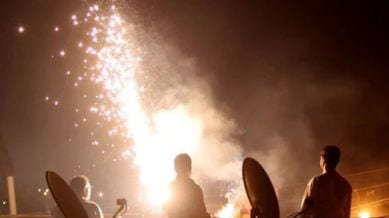Stay updated with the latest - Click here to follow us on Instagram
Delhi’s air quality deteriorates, 34 out of 38 stations in ‘red zone’ on Diwali evening
In response to rising pollution, the Commission for Air Quality Management (CAQM) on Sunday enforced Stage II of the Graded Response Action Plan (GRAP) across Delhi-NCR.

The air quality in Delhi plunged to the ‘very poor’ and ‘severe’ categories on Diwali, with 34 out of the city’s 38 monitoring stations recording pollution levels in the ‘red zone’ on Monday, according to the Central Pollution Control Board (CPCB).
The national capital’s 24-hour average Air Quality Index (AQI), reported at 4 pm daily, stood at 345, up from 326 on Sunday, as per CPCB data. As many as four monitoring stations recorded AQI levels above 400, placing them in the ‘severe’ category, according to the CPCB’s SAMEER app. Wazirpur recorded the worst air quality at 423; Dwarka 417; Ashok Vihar 404; Wazirpur 423; and Anand Vihar 404.
Around 30 other stations reported ‘very poor’ air quality, with AQI readings above 300.
By Monday afternoon, 31 stations recorded “very poor” air quality, while three registered ‘severe’ levels. Officials warned that overall air quality is likely to deteriorate further into the ‘severe’ range on Tuesday and Wednesday.
Data from the Decision Support System (DSS) showed that transport emissions contributed 15.6% to Delhi’s pollution levels on Monday, while industrial and other sources accounted for 23.3%.
The CPCB classifies AQI from 0 to 50 as ‘good,’ 51 to 100 as ‘satisfactory,’ 101 to 200 as ‘moderate,’ 201 to 300 as ‘poor,’ 301 to 400 as ‘very poor,’ and 401 to 500 as ‘severe.’
In response to rising pollution, the Commission for Air Quality Management (CAQM) on Sunday enforced Stage II of the Graded Response Action Plan (GRAP) across Delhi-NCR. Stage III GRAP correspond with ‘severe’ air quality.
Earlier, on October 15, the Supreme Court permitted the sale and use of green firecrackers in Delhi-NCR between 6 am and 7 pm, and again from 8 pm to 10 pm, on Diwali eve and the festival day.